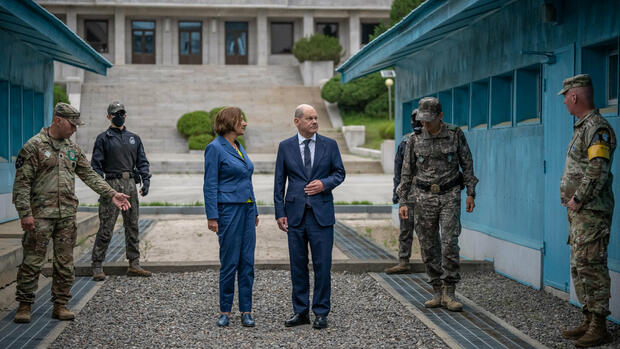It is the first purely bilateral visit by a chancellor to the country in 30 years.
(Photo: dpa)
Seoul North Korea is only three steps away for Olaf Scholz (SPD). But the chancellor is being watched. From the observation post on the North Korean side – a type of functional socialist building – a soldier with a telescope follows every step taken by the chancellor on the South Korean side. The security guard behind the opaque curtain can only be seen by zooming in on the cameras.
Here in Panmunjom, the 1953 armistice between North and South Korea was negotiated in the famous three blue-painted barracks. To this day, there is no peace treaty.
On the South Korean side, people talk about the other side of the border, which is not separated by a wall or fence, so only the “enemy”. Brisk walking or even running are not allowed, the German delegation was repeatedly told by the soldiers. Not that anyone on the other side is nervous.
“I invite you to North Korea”
Colonel Burke Hamilton, who is leading Scholz through the demilitarized zone, makes the chancellor an offer: “I hereby invite you to North Korea.” But unlike former US President Donald Trump, who walked between the borders in 2019, Scholz accepted the offer out of.
On the way back from the G7 summit in Hiroshima, the chancellor stopped in South Korea to cultivate ties with an old but somewhat neglected friend. Scholz’s visit is the first by a Chancellor since 1993. Germany and Korea have in common that both countries had to experience the misfortune of being divided. While Germany was able to overcome this, the Koreans have had to live with it since 1953.
“You can see how lucky reunification was for our country here,” says Scholz. And, of course, the 248-kilometer Korean border also shows what a frozen military conflict that many in Ukraine fear can look like.
The Ukraine war is a key reason why South Korea is regaining prominence on the world stage. Scholz is not the first head of government to visit Seoul these days. And just one day after his visit, EU Council President Charles Michel and EU Commission President von der Leyen are expected to attend the EU-South Korea summit.
South Korea is gaining geopolitical importance
As a thank you for a chancellor’s first visit in 30 years, South Korean President Yoon Suk Yeol praised Scholz for his “excellent leadership” and he very much supported Scholz’s change of direction. With so much praise, the Chancellor has to smile. Then Yoon also announces that he will join the global climate club initiated by Scholz. In addition, both countries wanted to work more closely together in the areas of hydrogen, semiconductors and supply chains.
Even if Yoon does not promise to deliver arms to Ukraine – South Korea is one of the largest arms exporters in the world – Scholz’s short visit was worth it.
Scholz has such high hopes in Yoon because he ushered in a similar foreign policy change of course almost at the same time as himself. Yoon’s left-wing predecessor, Moon Jae, had escalated a historical dispute with neighbor Japan to a diplomatic ice age. In contrast to Moon, Yoon seeks rapprochement with the second US ally in the region in order to counter North Korea and China together.
>> Read here: Common opponents weld South Korea and Japan together
Yoon and Japan’s Prime Minister Fumio Kishida have broken through the previous barriers. In Hiroshima they met for the third bilateral summit in three months. The United States in particular welcomes the new willingness to engage in talks among its allies, who have been deeply divided up to now. Closer cooperation between the two exporting nations could shift the balance of power in East Asia significantly to China’s disadvantage.
Dealing with the increasingly aggressive leadership in Beijing had previously been a major topic at the G7 summit. Scholz and the G7 could use any support to stand up to the giant empire. If Japan and South Korea get closer to each other again, that would be a great help. That’s another reason why Scholz is here.
Japan’s navy is considered the second most modern in the world and is also close to Taiwan, which China regards as a breakaway province. South Korea, on the other hand, also has around 500,000 men and women under arms and over three million reservists are on call because the country is threatened by North Korea with conventional and nuclear weapons.
Important trading partner for Germany
From a German point of view, South Korea is also interesting from an economic point of view. Germany exports more to South Korea than to Japan, even though this year’s G7 host has more than twice the population. Like Germany, South Korea also has its own Indo-Pacific strategy.
For all these reasons, from Scholz’s point of view, it makes sense to deepen relations through a visit. And in the end, the chancellor briefly entered North Korea. In the middle of the three barracks, called T2, the chancellor crossed the middle of the room and thus the border. And this time only under the observation of his South Korean hosts.
More: G7 herald new China policy
